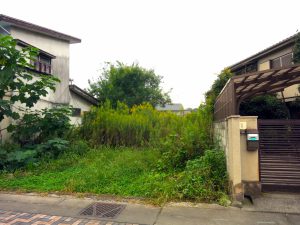Increasing Urgency for a Solution to Unclaimed Land
post date : 2017.11.27
These articles present editorials from leading Japanese newspapers (Asahi, Sankei, Nikkei, Mainichi, Yomiuri) covering the same theme.
The Asahi Shimbun:Eliminate red tape, hurry to create policies for unclaimed land
The Nikkei:Hurry to create laws to take advantage of ‘orphaned land’
Make land policies, including mandatory registration
The Mainichi Shimbun:Put a stop to the increase in unclaimed land
The Yomiuri Shimbun:Make policies for vacant land use, create new resources for the community

With the declining birth rate, aging population, and accelerating population decline, the amount of land whose owners are unknown has been rapidly growing in Japan and becoming a major social issue. According to estimates released at the end of October by a private research group headed by former Minister of Internal Affairs and Communications Hiroya Masuda, by 2040 there will be approximately 7.2 million hectares of land with unknown owners across Japan, causing an economic loss of six trillion yen. The estimate for total area of unclaimed land in 2016 is 4.1 million hectares, an area larger than Kyushu, but by 2040 the estimated amount of unclaimed land would be nearly as large as Hokkaido’s main island (7.8 million hectares).
In addition to the economic loss from land not being used due to population decline, there are also issues caused when it takes time to find the owners for reasons such as reconstruction from a disaster, making sure agricultural land is being used, and dealing with vacant houses. The 2017 Basic Policies for Economic and Fiscal Management and Reform adopted by the Cabinet in June this year indicated a law for making effective use of unclaimed land would be submitted to the next regular Diet session. The four main national papers (excluding the Sankei) have covered the issue of unclaimed land, discussing problems with the system for real estate registration system which is the biggest reason the owners of land become unknown, and calling for early implementation of effective measures such as introducing laws for effective use of land even if the owners are unknown.
■ Comprehensive, Radical Measures by Government Vital
In editorials on June 15 and October 27, the Nikkei discussed the issue of “orphaned land,” describing it as “a situation that is clearly alarming,” noting that since real estate registration is not currently mandatory, the number of people not registering in order to avoid the hassle and cost of managing property has been growing. The paper called for mandatory real estate registration, along with significant cuts to taxes and administration fees. The paper also called for the government to quickly implement “comprehensive, radical measures,” such as reconsidering the status of land ownership rights. The Nikkei suggests one reason for this worsening situation lies in “changes in Japanese citizens’ opinions towards land,” also noting, “The current sloppy real estate registration system also contributed to making this problem more severe.” The paper notes there are quite a few instances of land registrations from before World War II, and states the government is responsible for not putting effective measurements in place to prevent the registration system from becoming meaningless.
As a concrete measure, the paper calls for “consolidating land information” by cross-checking the real estate register with the tax list for property taxes. The paper also suggested the implementation of a system that would allow for a variety of uses for land even if the owners are unknown.
■ Consider Mandatory Real Estate Registration
The Asahi (September 21) also noted how the Ministry of Land, Infrastructure, Transport and Tourism and the Ministry of Agriculture, Forestry and Fisheries have partially dealt with this issue when it comes to reconstruction after disasters and building forest roads, but argued, “The results have been insufficient.” The paper further noted that the root of the problem lies in how frequently people who inherit land fail to register the transfer of ownership. To avoid this, the paper proposed, “Reducing the taxes for registration, or making registration mandatory are both options,” and called for the government to look into the legal issues surrounding the matter, regardless of the method used or its effectiveness.
The Mainichi (February 27), as an example of the severity of the unclaimed land issue, brought up the response to the Fukushima Daiichi nuclear accident. Of the 2360 people registered as owners of the land where the medium-term storage facility is being built in Fukushima prefecture, contact information cannot be found for about one quarter of them, which the paper noted has “become an obstacle to disaster prevention and reconstruction efforts.” The Vacant Houses Special Measures Act was implemented in 2015 in order to deal with the issue of vacant houses, making it possible for municipalities to forcibly demolish vacant houses that are at risk of collapsing. The Mainichi suggested, “It should be possible to consider a system for the government to respond flexibly at their discretion” for unclaimed land as well.
The Yomiuri (July 17) argued that the increasing numbers of vacant houses and vacant land coinciding with population decline should be considered as resources for community development, calling for “positioning them as catalysts for stimulating the local economy, and finding effective uses for them,” suggesting a focus on a policy to deal with unclaimed land. However, since the national and local governments do not accept donations of land as a rule when there are no plans to use that land for administrative purposes, currently land is abandoned and allowed to go to waste without its inheritance being registered. The Yomiuri called for policies to find a use for this land: “Government bodies, real estate professionals, and civilian organizations should form a council and create a vision for community development.”
English translations are provisional. The content of this page was made by the Foreign Press Center Japan and does not reflect the opinion of the Japanese Government or any other organization.



